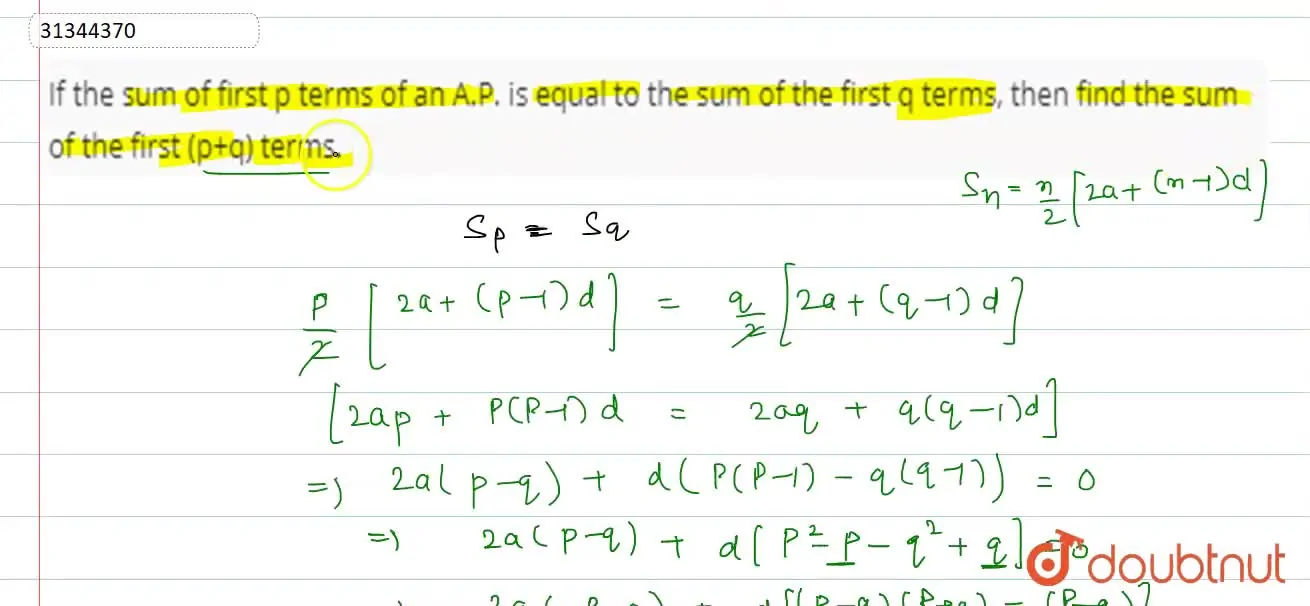If the sum of first p terms of an A.P. is equal to the sum of the first q terms, then find the sum of the first (p+q) terms.
The correct Answer is:N/a
Let first term be 'a' and common difference be 'd' of the A.P.
According to the problem,
Related Playlists
- BOOK - NAGEEN PRAKASHANCHAPTER - SEQUENCE AND SERIESEXERCISE - Exercise 9.332videos
SEQUENCE AND SERIES
- BOOK - NAGEEN PRAKASHANCHAPTER - SEQUENCE AND SERIESEXERCISE - Exercise 9.410videos
SEQUENCE AND SERIES
- BOOK - NAGEEN PRAKASHANCHAPTER - SEQUENCE AND SERIESEXERCISE - Exercise 9.114videos
SEQUENCE AND SERIES
- BOOK - NAGEEN PRAKASHANCHAPTER - RELATIONS AND FUNCTIONSEXERCISE - MISCELLANEOUS EXERCISE12videos
RELATIONS AND FUNCTIONS
- BOOK - NAGEEN PRAKASHANCHAPTER - SETSEXERCISE - MISC Exercise16videos
SETS
Similar Questions
If the sum of the first 9 terms of an AP is equal to the sum of its first 11 terms, then find the sum of its first 20 terms.
View SolutionIf the sum of the first 9 terms of an AP is equal to the sum of its first 11 terms, then find the sum of its first 20 terms.
View SolutionThe sum of first p- terms terms of an A.P. is q and the sum of first q terms is p, find the sum of first (p + q)
View SolutionThe sum of first p- terms terms of an A.P. is q and the sum of first q terms is p, find the sum of first (p + q)
View SolutionIf sum of first 20 terms of an A.P. is equal to sum of first 30 terms of the A.P. then sum of the first 50 terms of the A.P. is
View SolutionIf the sum of the first 9 terms of an A.P. is 81 and that of the first 18 terms is 324, find the sum of its first n terms.
View SolutionIf the sum of first 10 terms of an A.P is 60 and sum of first 15 terms is -165 then find the sum of its n terms
View SolutionThe sum of first ten terms of an A.P. is 155 and the sum of first two terms of a G.P. 9. The first term of the A.P. is equal to the common ratio of the G.P. and the first term of the G.P. is equal to the common difference of the A.P. which can be the A.P. as per the given conditions?
View SolutionIf the sum of first 6 terms of A.P.is 96 and sum of first 10 terms is 240 ,then find the sum of n terms of A.P.
View SolutionThe sum of first 20 terms of an A.P. is one third of the sum of next 20 term. If first term is 1, find the sum of first 30 terms of this A.P.
View Solution


